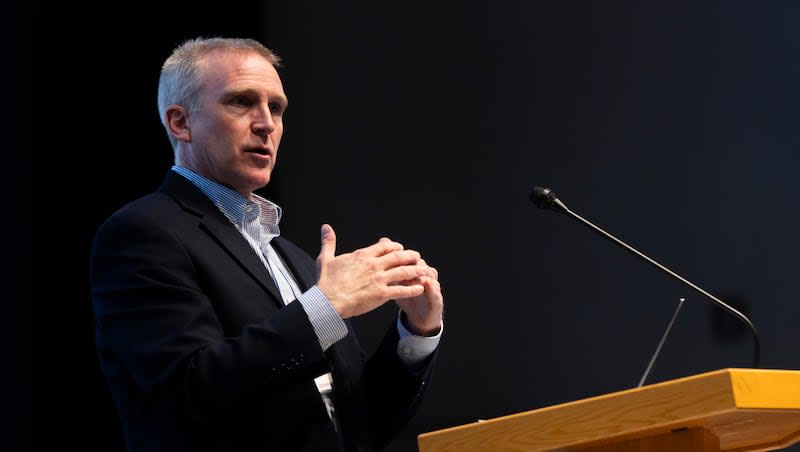Inside the interfaith, academic ‘The Chosen’ conference held at BYU

The first-ever interfaith academic conference about the historical drama “The Chosen” attracted hundreds of community members and included various perspectives teasing out key aspects of the show.
“The Chosen” president and executive producer Brad Pelo’s keynote on Thursday evening drew in a packed auditorium to kick off the conference. It was followed Friday by academic presentations about the show.
Professors from different schools also went on a tour of the Utah filming location of “The Chosen.” The show is filmed in both Utah and Texas. When in Utah, the production uses the Motion Picture Studio South Campus, which is owned by The Church of Jesus Christ of Latter-day Saints.
Typically, academic conferences are attended by scholars who use the time allotted for networking and discussing the state of the field. At this conference, there were scholars present as well as fans who sported merchandise. Stan Jantz, CEO of the Come and See Foundation, was also in attendance as a presenter.
Ahead of the conference, John Hilton III, BYU professor and conference organizer, told the Deseret News that the intention of it was to be more accessible than other scholarly gatherings.
“Academic conferences sometimes have a reputation for being a little dry with scholars formally reading papers,” Hilton said. “One of the things that we’re trying at this conference is to have a high level of scholarship, but also present it in a way that’s engaging and accessible.”
During the conference, presenters showed pictures from the show and sometimes shared their own personal favorite moments. Many of them praised the show specifically for its portrayal of Jesus.
James F. Keating, a Providence College professor, gave a presentation on the show in the context of a common scholarly topic: the historical Jesus.
Keating, a Catholic, said that historical questions around Jesus found particular importance for Christians.
“As strange as it might sound, the decision of the creators of ‘The Chosen’ to employ their artistic imaginations to invent stories about Jesus and his followers uphold and give credence to that most central and decisive of Christian beliefs — the Word became flesh and made his dwelling among us,” Keating said.
Baylor University professor Robert Garcia said he watched “The Chosen” while keeping in mind “personhood.” As a philosopher, Garcia said he’s been studying this issue, especially as it relates to the idea that every person has irreplaceable value.
“The Chosen” portrays this idea, Garcia said.
“What I find interesting is that in ‘The Chosen,’ you see, the writers put into the words of Jesus, the character, the following statement,” Garcia said. “Jesus is saying, ‘Mr. Peter, every one of these people I have called for a reason. Each of them brings something unique and important to the whole.’”
Garcia noted that Jesus was not quoted as saying it, but it’s something he said in the show and it seems plausible, given what else Jesus had said as recorded in the New Testament.
“Jesus’ focus is on the one. He sees everyone, but he sees you. He’s focused on individual people,” Garcia said.
In addition to focusing on historical and philosophical issues, pedagogical matters also found their way into the conference.
Another presenter, Joel R. Gallagher from The Catholic University of America, gave a presentation entitled “‘The Chosen’ in the Classroom: ‘I Know That Power Has Gone Out From Me.’”
Gallagher said his presentation would be centered on his experience using scenes from “The Chosen” in the classroom.
“Now as I understand it, you’re all here quite voluntarily, and you’re here because you love ‘The Chosen.’ You’re interested in the course material,” Gallagher said. “It’s not always the case with undergraduate students, even some who are generally interested in the course material.”
Gallagher said he weaves together different mediums of art including music and poetry to teach. He uses “The Chosen” for specific purposes including to ask questions around how Jesus was impacted by the events that unfolded in the Gospels.
As his first example, Gallagher spoke about the healing of a woman with an issue of blood. The woman reaches out to Jesus to touch his hem because she believes he has the power to heal him.
Praising Jonathan Roumie’s portrayal of this scene, Gallagher said, “We see Jesus, something happens to him in turn. Apparently, he’s almost knocked off his feet. He’s knocked off balance. Something has touched him emotionally.”
Gallagher said this scene can be used to start a conversation about what happened when Jesus said his power went out of him and to talk about what healing meant for him.
These are just a couple examples of presentations that took place at the conference.
Biola University professor Douglas S. Huffman spoke about how the show balances authenticity and plausibility with relatability. Paul Gondreau, Providence College professor, presented on how the show portrays the human aspects of Jesus.
Jesse Stone, theological coordinator at One Hope, talked about the emotional resonance of the show. Gaye Strathearn, BYU professor, discussed the women in “The Chosen.” Other presenters included Matthew Grey, David Kneip, Patrick Gray, Daniel Garland Jr., Ken Gumbert, T. Adam Van Wart and Hilton.

